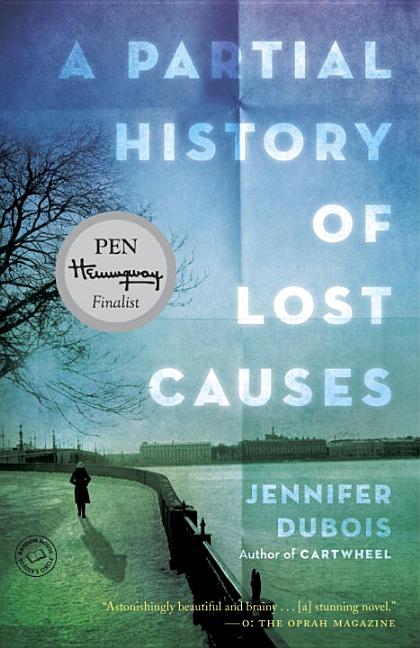Jennifer duBois is the author of The Last Language. Her first novel, A Partial History of Lost Causes, was a finalist for the PEN/Hemingway Award for Debut Novel and winner of the California Book Award for First Work of Fiction. Soon after its publication, duBois received a National Book Foundation 5 Under 35 Award. Her second novel, Cartwheel, was a finalist for the New York Public Library’s Young Lions Fiction Award and the winner of the Housatonic Book Award. Her third novel, The Spectators, was a recipient of a National Endowment for the Arts Creative Writing Fellowship and a Civitella Ranieri Fellowship. A graduate of the Iowa Writers’ Workshop and the Stanford University Stegner Fellowship, duBois teaches in the MFA program at Texas State University. She lives in Austin.

-
A Partial History of Lost CausesA Novel
I told him about the nucleotides, the genetic test, the prognosis. I told him that atrophying of basal ganglia starts years before symptoms present, and that right now—in this car, in this moment—parts of my brain were dying, parts that I didn’t know I needed, but parts that I would never, never be able to get back. I told him that there wasn’t an emotion or an impulse or a stumble that I could completely trust; I told him that one day—if I let it—everything I did and said and thought would be nothing more than the entropic implosion of a condemned building or a dying star.
 A Partial History of Lost Causes :A Novel
A Partial History of Lost Causes :A Novel -
A Partial History of Lost CausesA Novel
The wedding was in October at a downtown wedding palace, and Aleksandr showed up uninvited just in time to watch Elizabeta walk down the aisle to the national anthem. For the rest of his life, Aleksandr would grimace whenever he heard the song. Other people would notice and remark on how genuinely Alexsandr must have loathed the regime. But it wasn’t the regime that came to mind for him when he heard the song—not Stalin’s twenty million dead or men falling down in the skull-white gulag or Misha’s piss-soaked psychiatric prison. It was Elizabeta walking down the aisle toward a Party official, his face smooth and expectant in the wan, faintly buzzing light.
 A Partial History of Lost Causes :A Novel
A Partial History of Lost Causes :A Novel -
A Partial History of Lost CausesA Novel
A decade passed in slow motion, then faster and faster. When Aleksandr looked back, it returned in snatches, on repeat, hiccupping and distorted sometimes, like a scratched record. There were some good times, of this he was sure—some nice nights with Nina, especially at the beginning, though in memory it became difficult to ascertain how many of the nights were actually nice. Was it one night or two or a half dozen or a dozen? Or was it typical, was it usual, for them to slow-dance in front of that enormous picture window, with St. Petersburg cracked open before them, backlit by the moon, shining with all the grandeur of ancient Rome?
 A Partial History of Lost Causes :A Novel
A Partial History of Lost Causes :A Novel
“[An] astonishingly beautiful and brainy debut novel . . . Against the backdrop of Russia’s recent political past, duBois conjures the briefly intersecting lives of two intriguingly complex strangers—prickly, introspective, and achingly lonely—who are nevertheless kindred spirits. Her prose is both apt and strikingly original . . . So how do we proceed when defeat is inevitable? The stunning novel suggests an answer: We just do. Perseverance, it seems, is its own kind of victory.” —O, The Oprah Magazine [on A Partial History of Lost Causes]
“Psychologically astute . . . DuBois hits [the] larger sadness just right and dispenses with all the salacious details you can readily find elsewhere. . . . The writing in Cartwheel is a pleasure—electric, fine-tuned, intelligent, conflicted. The novel is engrossing, and its portraiture hits delightfully and necessarily close to home.” —The New York Times Book Review (Editor’s Choice)
“[Jennifer duBois is] heir to some of the great novelists of the past, writers who caught the inner lives of their characters and rendered them on the page in beautiful, studied prose . . . She aims to observe the thoughts that intrude at the most inappropriate times, to capture memories and intricate emotions, and to make penetrating comments about living today. In Cartwheel, she accomplishes this with acrobatic precision.” —Pittsburgh Post-Gazette
Selected Works

- Print Books
- Bookshop

- Print Books
- Find your local bookstore (via IndieBound)
- Powell's
- Barnes & Noble
- E-Books
- Kobo
- Google Books
- Barnes & Noble


“A Partial History of Lost Causes is a fantastically self-assured debut. A novel of the Cold War, the book works from its own profound metaphors and preoccupations, and the result is enthralling and deeply intellectually engaging. Ambitious and wide-ranging, its scenes in Russia are especially noteworthy, confidently and convincingly rendered. Ms. duBois wears a mix of erudition lightly, using chess, the ravages of disease, politics, and the provocatively intertwining narratives to create a graceful thematic and fluid structure.”